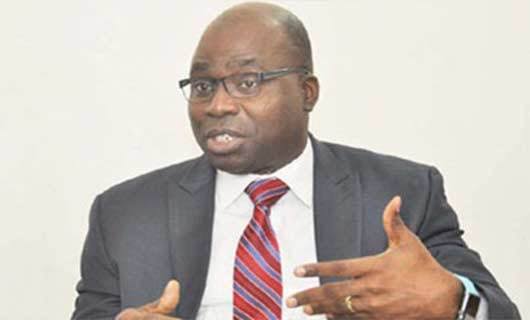Nigeria Loses $10bn to Illicit Financial Flows – ICPC Chairman

ICPC chairman, Prof. Bolaji Owasanoye
*Calls for the setting up of social safety mechanism
The Chairman of the Independent Corrupt Practices and Other Related Offences Commission, Prof. Bolaji Owasanoye, SAN, has revealed that Nigeria accounts for 20 percent (about $10 billion) of the estimated $50 billion that Africa was losing to Illicit Financial Flows (IFFs).
Prof. Owasanoye made the disclosure in his welcome remark at a physical and virtual zoom meeting to review the report on IFFs in relation to tax.
According to the ICPC Chairman, “The African Union Illicit Financial Flow Report estimated that Africa is losing nearly $50 billion through profit shifting by multinational corporations and about 20 percent of this figure is from Nigeria alone.”
The ICPC boss explained that taxes were “very strategic role in the nation’s political economy.”
Against this backdrop, he underscored the importance of the meeting, noting that it would afford participants the opportunity to openly discuss on how to effectively use the instrumentality of taxation to curb IFFs through “risk-based approach to monitoring and audit; due process in tax collection; structured tax amnesty framework especially that which is skewed in public interest; data privacy; timely resolution of audits and payment of tax refunds; and intelligence sharing among revenue generating; regulatory; and law enforcement agencies.”
The ICPC boss also stated that for the contemporary tax man to remain relevant, he must build his capacity in areas of technology management, solution architects and an astute relationship manager.
He, therefore, pointed out that the objective of the meeting was to improve on the awareness on IFFs, especially in the areas of taxation.
In his contribution to the discourse, the Executive Chairman of Federal Inland Revenue Service (FIRS), Mr. Muhammad Nami, expressed concerns that IFFs pose a serious threat to the Nigerian economy as the act robs the nation of resources that are needed for development.
Mr. Nami declared that tackling IFFs would expand the country’s tax base of the Nigerian nation and improve revenue generation which was required for development.
He consequently pushed for policy reforms that would make it difficult for “capital flights” from occurring so that the country would be placed on the path of growth.
Other discussants at the event who spoke with one accord, identified weak regulatory framework, opacity of financial system and lack of capacity amongst others as some of the factors that fuel IFFs.
The discussants again unanimous emphasized the need for capacity building of relevant stakeholders as one of the ways to stamp out illicit flows.
They therefore commended ICPC for leveraging its corruption prevention mandate to open a new vista in IFFs discourse in Nigeria.
In another development, The ICPC Chairman, Professor Bolaji Owasanoye (SAN) has called for the setting up of a social safety mechanism to help victims of rape and other gender violence overcome the trauma and psychological effects associated with such crime.
Professor Owasanoye, who made the call recently while receiving an NGO, the Gender Mobile Initiative in his office emphasized the need for gender equality in order to move the nation forward.
The ICPC Boss further disclosed that the Commission was designing a curriculum to train its investigators on how to track cases of sexual harassment as it relates to abuse of power..
He said that he took particular interest in the gender violence activities of the NGO because they are largely focused on the youths and went further to condemn the level of stigma associated with rape and other gender violence which he said made most victims unwilling to pursue justice.
During the interaction, the Executive Director of the NGO, Ms Omowumi Ogunrotimi stated that the organisation was established to advance gender equality with a view to eliminating gender based violence (GBV) in Nigeria adding that currently they were partnering with over 100 tertiary institutions in the country to develop a policy aimed at prohibiting sexual harassment.
Ogunrotimi said that the organisation would design a social media app before the end of April this year that would help victims of sexual harassment report such cases.
Contributing to the discussion, the Director of Public Enlightenment and Education, Mr. Mohammed Baba Ashiru enumerated various platforms in the ICPC that could be deployed to support the initiatives of the organisation. He specifically mentioned the National Anti-Corruption Coalition (NACC) which allows NGOs to register and partner with the ICPC in achieving specific targets as well as Anti-Corruption Vanguards in tertiary institutions which could be used to sensitize the students on sexual harassment.
The Spokesperson of the ICPC, Mrs. Azuka Ogugua also proposed a digital collaboration among both parties using social media tools such as Twitter, Facebook and instagram.
Members of Gender Mobile Initiative who were present at the event included Omowumi Ogunrotimi Esq (Executive Director), Oludamilola Olaope (Legal Adviser), Eno Ekpo (Programme Analyst) and Sarah Egbo (Policy support Lead).





